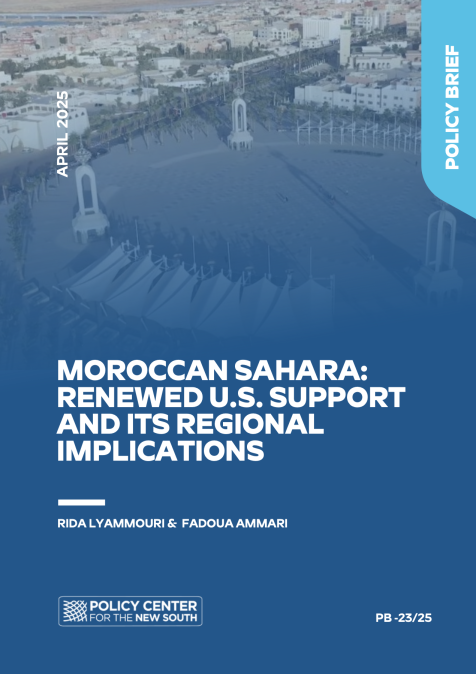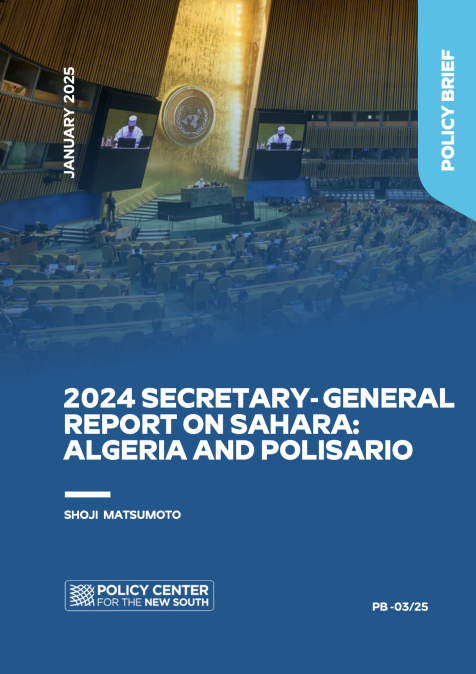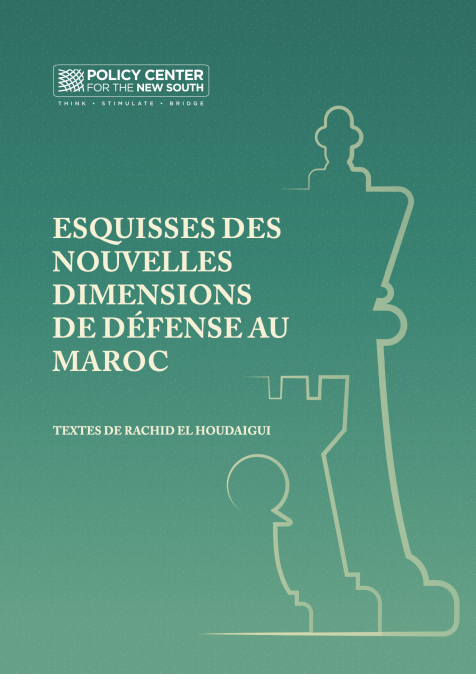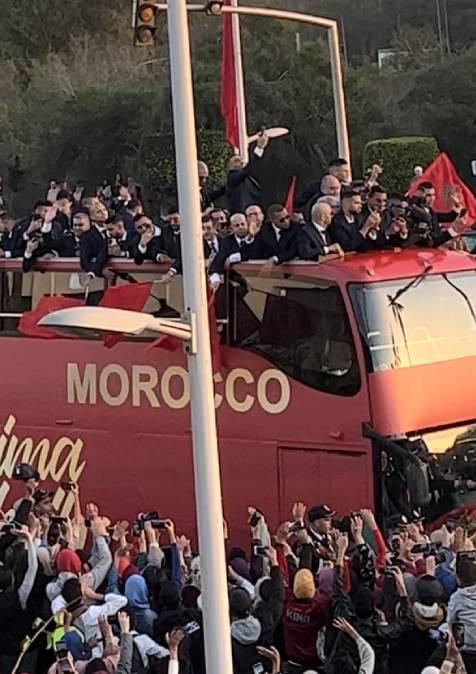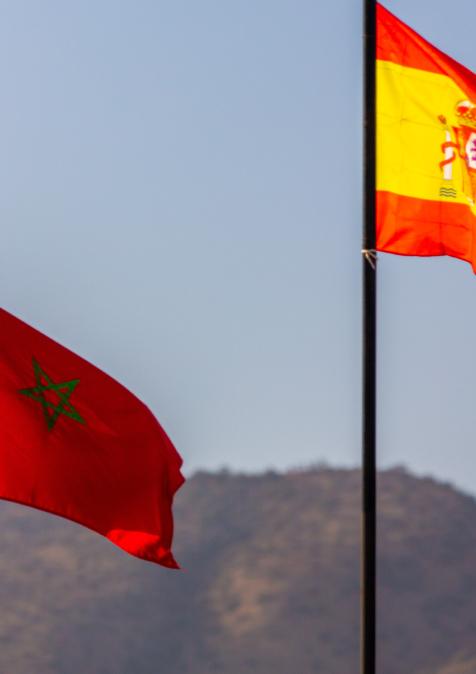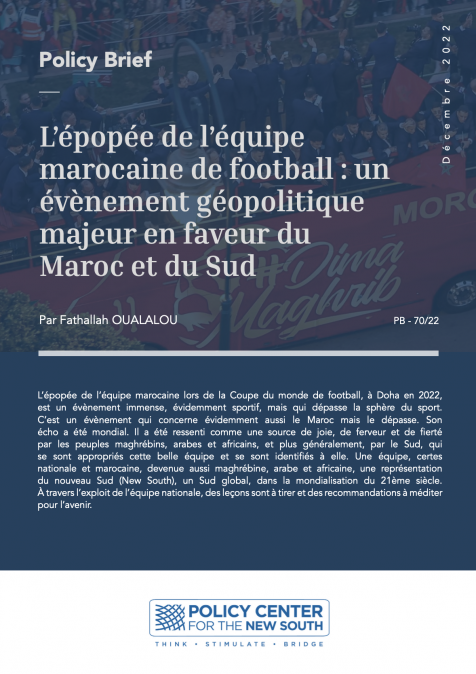Publications /
Policy Brief
This Policy Brief analyzes the strategic significance of the reaffirmation by the United States, on April 8, 2025, of its support for Morocco’s sovereignty over the Moroccan Sahara and of Morocco’s autonomy plan for the territory. This position, which has been maintained under different U.S. administrations, confirms the appropriateness of the Moroccan approach based on compromise, regional stability, and economic integration. It reinforces the isolation of the Polisario Front, whose stubborn stance on independence is struggling to win international support.
At the same time, the Moroccan Sahara is becoming central in the Royal Atlantic Initiative, through development projects such as the Port of Dakhla and the Nigeria-Morocco gas pipeline. Against a backdrop of instability in the Sahel and heightened geopolitical rivalries, the U.S. reaffirmation is a major diplomatic victory for Rabat. It reinforces Morocco’s vision of a stable, connected Sahara that will bring shared prosperity to Africa and its Atlantic partners.
INTRODUCTION
On April 8, 2025, in Washington D.C., U.S. Secretary of State Marco Rubio officially reaffirmed U.S. support for Morocco’s sovereignty over the Sahara and for the Moroccan autonomy plan[1]. During a meeting with Moroccan Foreign Minister Nasser Bourita, Rubio stressed that the U.S. “recognizes Morocco’s sovereignty over the Sahara” and considers the autonomy plan proposed by Rabat to be “serious, credible and realistic”, and “the only feasible solution” for managing the Sahara question[2].
These statements followed on from the historic decision of December 2020, when, during his first term in office, President Donald Trump officially backed Morocco’s sovereignty over the Sahara. Rubio’s statement confirmed that this American position has enduring political force, maintained under successive administrations.
The U.S. reiteration of its position comes against a complex regional backdrop marked by persistent crises in the Sahel and major tensions in the Middle East, and also by diplomatic developments in favor of the Moroccan autonomy plan. In recent years, there has been an erosion of international support for the Polisario Front in favor of the Moroccan proposal, as shown by the rallying of European, Arab, and African countries behind the autonomy proposal[3].
Despite regional turbulence, Morocco is asserting itself as a pole of stability and shared prosperity, making the Moroccan Sahara a crucial part of its development and regional integration strategy. This Policy Brief starts in the next section by providing an overview of the U.S. position on the Moroccan Sahara, tracing the origins of Washington’s position, and the factors that led to its continuation under different administrations. We then examine the regional repercussions of this posture adopted by the U.S., focusing in particular on its potential impact on the balance of power in the Maghreb, security cooperation in the Sahel-Saharan region, and the dynamic of Atlantic integration promoted by the Royal Atlantic Initiative.
HISTORICAL ROOTS AND DIPLOMATIC STAKES
An Enduring U.S. Diplomatic Line in Morocco's Favor
The U.S. declaration of April 8, 2025, is in line with the U.S. policy defined at the end of 2020. At that time, President Trump signed an executive order recognizing Moroccan sovereignty over the Sahara, and affirming that the autonomy plan presented by Morocco in 2007 was the only basis for a just and lasting solution[4].
This recognition strengthened Morocco’s diplomatic position, while marginalizing separatist claims[5]. For Morocco, it was the culmination of years of diplomatic efforts aimed at rallying the major powers to its cause[6]. This explicit support from the United States, a long-standing ally of Morocco and permanent member of the United Nations (UN) Security Council, considerably strengthened Morocco’s position in the international negotiation process, legitimizing its autonomy plan on the world stage[7]. Washington has explicitly confirmed that its recognition of Moroccan sovereignty over the Sahara is a lasting diplomatic achievement[8], and not just a temporary announcement.
Moreover, the strategic position adopted by Washington is not based solely on bilateral considerations, but is part of a broader reading of U.S. geopolitical interests. The resolution of the Sahara question would serve three major objectives[9] for the U.S.:
1- Curb the growth of Chinese influence in North Africa, a region that China targets for commercial and security reasons;
2- Demonstrate the U.S.’s ability to shape concrete outcomes in areas of longstanding tension, thereby reinforcing its diplomatic credibility;
3- Consolidate ties with a stable and reliable partner—Morocco—while fostering the emergence of new strategic alignments across the region. In this sense, U.S. backing for the Moroccan autonomy plan is not limited to a one-off act of support, but is part of a logic of power projection and securing American influence in a competitive space.
Morocco's Proactive Diplomacy: Towards a Stronger Partnership With Washington
These American statements are largely explained by the particularly proactive diplomatic approach taken by Morocco in recent years. On August 20, 2022, during the 69th anniversary of the Revolution of the King and the People, His Majesty King Mohammed VI declared that “the Sahara issue is the prism through which Morocco views its international environment”[10]. This statement underlined the central importance of the Sahara issue for Moroccan foreign policy.
Rabat has made it clear that the Moroccan character of the Sahara is the prism through which the Kingdom defines its international partnerships[11]. This doctrine has produced tangible results: since 2019, many African, Arab, and Latin American states have opened consulates in the Saharan cities of Laâyoune and Dakhla (there are over 20 African consulates to date), signifying their implicit recognition of Moroccan sovereignty[12].
At the same time, several Western powers have gradually adopted a position more in line with the Moroccan vision. Spain, for example, officially backed the Moroccan autonomy plan in March 2022, while France has confirmed an alignment with the Moroccan proposal, describing it as “the only basis for achieving a just, lasting and negotiated political solution in accordance with the resolutions of the United Nations Security Council”[13]. The United Kingdom[14] has also demonstrated its openness to the Moroccan position, while countries including Germany[15] and the Netherlands[16] have publicly supported the Moroccan autonomy plan over the past two years. This Western convergence, added to the support shown by Arab (including the United Arab Emirates, Saudi Arabia, and Jordan) and African countries, is creating an increasingly broad pro-autonomy diplomatic front. Algeria and the Polisario, meanwhile, appear increasingly isolated on the international stage, maintaining their outdated demand for an independence referendum.
These favorable international developments have reinforced the legitimacy and credibility of the Moroccan proposal as a compromise solution. The support from France, Spain, and other European countries could prompt still more European countries to adopt similar positions, thus influencing regional dynamics and necessitating a review of the UN-led resolution process[17].
On a bilateral level, the Moroccan-U.S. strategic relationship has gradually consolidated and diversified, paving the way for the announcement of April 8, 2025. From 2021 to 2024, Morocco worked to institutionalize dialogue with the U.S. administration, involving not only the White House but also Congress and circles of influence in Washington[18]. Morocco enjoys cross-cutting support in the United States, as demonstrated by the Moroccan-American Friendship Group in Congress—exemplified by figures such as Representative Joe Wilson, who publicly welcomed this reminder of U.S. support for the Moroccan Sahara[19]—and the backing of influential senators[20].
The April 8, 2025 meeting in Washington was a concrete illustration of the sustained efforts of Moroccan diplomacy. In addition to his exchange with Secretary of State Marco Rubio, Minister Nasser Bourita met with several influential figures, including National Security Advisor Mike Waltz, to consolidate the consensus around the partnership between Rabat and Washington, and to examine regional issues of common interest[21].
The U.S. statement should not be interpreted as merely symbolic. On the contrary, it reflects an explicit desire on Washington’s part to inject a new diplomatic dynamic into the Sahara question. It remains to be seen how this development can influence regional geopolitics and foster new prospects for integration and cooperation, and what actions need to be taken to capitalize on this U.S. support over the long term.
BETWEEN MAGHREB GEOPOLITICS AND ATLANTIC INITIATIVES: THE MOROCCAN SAHARA AT THE CENTER
A Reconfigured Balance of Power in North Africa
The reaffirmation of U.S. support for the Moroccan autonomy plan has significant geopolitical repercussions, both for the Maghreb and for the region as a whole. Primarily, it contributes to reinforcing the isolation of the Polisario Front and its supporters. Algeria, the Polisario Front’s main backer, has officially “regretted”[22] the U.S. reiteration of its position in favor of Moroccan sovereignty over the Sahara, a diplomatic reaction that testifies to its unease at Washington’s alignment with the Moroccan position. However, greater U.S. involvement could help facilitate discussions between Morocco and Algeria, or at least reduce the risk of confrontation, given the tensions surrounding the Moroccan Sahara[23]. Similarly, France’s recognition in July 2024 of Morocco’s autonomy plan for the Sahara prompted a strong reaction from Algiers[24], which recalled its ambassador from Paris in protest. These developments reflect the continuing tensions between Algeria and the Western powers over the status of the Moroccan Sahara.
At UN level, since 2021, the annual resolutions of the UN Security Council concerning the Sahara issue have evolved in their wording[25]. They welcome Morocco’s “serious and credible” efforts, in particular the 2007 autonomy plan, without explicitly mentioning the referendum option. This evolution reflects a shift in the Security Council’s approach, emphasizing a realistic and mutually acceptable political solution. With Washington’s support, this orientation could turn into firm pressure for future talks under UN auspices to focus exclusively on the autonomy scheme. Marco Rubio has made it clear that the United States sees the Moroccan autonomy plan as the “sole framework” for a mutually acceptable solution[26].
In terms of security, this diplomatic development is also likely to encourage a gradual stabilization of the situation on the ground, by sending a dissuasive signal to Polisario Front elements inclined to armed confrontation. It should be recalled that the ceasefire established in 1991 under the United Nations was broken in November 2020, following the intervention of the Royal Armed Forces in order to re-establish the free movement of goods and people at the Guerguerat border post, which had been illegally blockaded by separatist militants. The resumption of hostilities by the Polisario since this episode has in no way altered the strategic balance, reinforcing the argument for a realistic political solution based on autonomy[27].
In addition, this already well-established security cooperation has the potential to be strengthened, particularly in terms of monitoring cross-border dynamics in the Sahel-Saharan region. Security cooperation could play a greater role in preventing the infiltration of violent extremist groups operating in this unstable area. The U.S. considers Morocco to be a key player in regional security, given its ongoing commitment to stability in North Africa and the Sahel[28]. From this perspective, a fully integrated and pacified Sahara under Moroccan sovereignty would be a factor in consolidating regional order, by neutralizing the risk that the area becomes a sanctuary for transnational criminal networks or violent armed groups. However, regional stability also requires a broader approach to economic and diplomatic integration. This is where the Royal Atlantic Initiative comes in.
The Royal Atlantic Initiative: Moroccan Sahara Pivotal to Afro-Atlantic Integration
Beyond the issue of the immediate balance of power, Washington’s renewed recognition of the autonomy plan is part of Morocco’s long-term strategic vision for regional integration. For several years, Morocco has been reorienting its diplomatic and economic focus towards Africa and the Atlantic area, putting the Sahara at the heart of this approach. The U.S. impetus thus supports a broader regional project in which the Moroccan Sahara is conceived, not as a disputed territory, but as a crossroads of connectivity between Morocco, West Africa, and the Atlantic.
The Royal Atlantic Initiative, launched by HM King Mohammed VI, embodies this vision. Presented in 2022-2023, the Royal Atlantic Initiative proposes an innovative model of regional cooperation based on the dynamics of increased connectivity, positive interdependence, and sustainable development[29]. Conceived “by Africa and for Africa”[30], it aims to bring together Atlantic Rim countries in Africa and Latin America, building cross-border partnerships that transform common challenges into shared opportunities[31].
Morocco’s Atlantic integration strategy is based on two main pillars: the development of an Atlantic port network, centered on the deepwater port of Dakhla, intended to become a regional logistics hub, and the creation of energy corridors such as the Nigeria-Morocco gas pipeline, which will bring gas resources from the Gulf of Guinea to Europe, via several West African countries[32].
Thanks to its strategic geographical position, both continental and maritime, Morocco has both African and Atlantic roots, making it a natural hub for inter-regional cooperation[33]. Within the framework of the Atlantic Initiative, the full integration of the southern provinces is of decisive importance. Indeed, the Moroccan Sahara is destined to become a major logistical interface between sub-Saharan Africa and the transatlantic area, contributing to the establishment of integrated economic corridors[34]. This positioning gives the Saharan provinces a central role in the implementation of a regional development project built around connectivity, the movement of resources, and the complementarity of spaces.
Several projects testify to the growing importance of the southern provinces in Morocco’s strategy of regional integration. The Atlantic Port of Dakhla on the Saharan coast, for example, embodies this ambition. Designed as new-generation logistics infrastructure, this port is intended to become both a regional trade hub, linking West African markets to Europe via Moroccan corridors, and a platform for opening up to the Americas[35], thanks to Dakhla’s geographical position facing the Latin American coast. The project is thus part of a transcontinental connectivity strategy designed to further African integration and strengthen Morocco’s position in global value chains. As noted by Y. Amrani, Morocco's ambassador to Washington, this project will transform regional maritime routes into “real engines of economic development for the region” of Dakhla and beyond[36].
This commitment to developing major infrastructure is also seen in the energy sector, with the Nigeria-Morocco Atlantic Gas Pipeline project, which will link Nigeria’s gas reserves to markets in North Africa and Europe, along a 5,600-kilometer route along the Atlantic seaboard and through 13 African countries, from the Gulf of Guinea to Morocco via its southern provinces. This energy corridor is an example of how South-South cooperation can be structured, in line with Moroccan diplomatic doctrine, centered on continental solidarity and the strengthening of regional integration[37].
Backed by the Economic Community of West African States (ECOWAS)[38] and endorsed by the countries concerned[39], this project should strengthen energy security in the countries it passes through, particularly in West Africa, while providing Europe with a new, diversified supply route via the Moroccan gas hub[40]. For the southern provinces, the gas pipeline represents a strategic development opportunity: it would lead to substantial investment in infrastructure, and could foster the emergence of a local economic fabric linked to energy and logistics[41].
Consequently, resolving the artificial dispute over Morocco’s territorial integrity is not only the culmination of a diplomatic process, but also an essential prerequisite for initiating a new dynamic of regional integration. In this context, Morocco’s Atlantic Initiative is one of the structural frameworks capable of articulating the Kingdom’s economic, geopolitical, and diplomatic ambitions in a broader environment. However, the effective realization of these dynamics remains conditional on the maintenance of a sustained diplomatic commitment, the consolidation of existing strategic alliances, and the implementation of coordinated actions that enable political advances to be translated into real benefits for the territories concerned and their populations.
CONCLUSION
The U.S. statements of April 8, 2025, explicitly supporting Moroccan sovereignty over the Sahara and the Moroccan autonomy plan, marks a decisive diplomatic turning point. The statements underline that the Moroccan plan is now seen as the most realistic basis for a lasting resolution of this issue. Beyond the imperatives of sovereignty, the Moroccan Sahara is becoming a strategic lever for regional integration, positioning the Kingdom as a key player in South-South cooperation and Atlantic connectivity.
Although challenges remain, the international situation appears increasingly favorable to the Moroccan proposal. Drawing on its historical legitimacy and significant diplomatic advances, Morocco is in a position to consolidate its gains and position the Sahara as a pole of stability, economic growth, and shared prosperity.
This positive dynamic is all the more true as the Polisario Front, supported by Algeria, finds itself progressively marginalized, its unchanged discourse on independence struggling to adapt to geopolitical realities and the demand for pragmatic solutions. The gradual erosion of its international support, combined with the failure of its military strategies, compromises its credibility and accentuates its isolation, to the benefit of a growing consensus around autonomy under Moroccan sovereignty. Ultimately, this trend confirms that Morocco’s vision of autonomy has taken root on the regional and international stages.
BIBLIOGRAPHY
Ammari, F. (2024, April 24-25). Regional integration in the Sahel, vector of development, security and stability: alignment with the approach of the Royal initiative for Sahelian countries [Paper presented at the International Forum on "The Moroccan Sahara as cultural heritage and integration space in the Afro-Atlantic basin, from the insightful Royal vision"]. ISHAA Center for Geopolitical and Strategic Studies, ENCG Dakhla.
Atlantic Council (Fabiani, R.) (2023, August 3). The Western Sahara conflict: A fragile path to negotiations. Atlantic Council.
Bobin, F., Aublanc, A., & Ricard, P. (2024, July 30). Sahara occidental : Paris s'alignigne sur la position de Rabat, au risque d'une nouvelle crise avec l'Algérie. Le Monde.
Economic Community of West African States (ECOWAS). (2022, December 6). ECOWAS backs the Nigeria-Morocco Gas Pipeline Project as a strategic energy corridor for the region.
U.S. Department of State (2025, April 8). Minutes of Secretary Rubio's meeting with Moroccan Foreign Minister Bourita.
El Houdaïgui, R. (Dir.). 2016. Africa's Atlantic seaboard: a geopolitical space under construction. Policy Center for the New South.
Fakir, I. (2024). French embrace of Moroccan autonomy plan underscores broader shift on Western Sahara dispute. Middle East Institute.
Fana News / U.S. State Department. (2024, Feb. 5). U.S. Underlines Multifaceted Partnership with Morocco in the Service of Peace and Prosperity.
Financial Afrik (2025, January 23). African Atlantic Gas Pipeline: A Pan-African Response to Global Geopolitical and Energy Challenges.
L'Économiste (2023, November 21). Nigeria-Morocco gas pipeline: things take shape.
Le Courrier de l'Atlas (2025, April 9). Sahara: Washington reaffirms its recognition of Moroccan sovereignty.
Le Figaro. (2022, August 25). Western Sahara: Germany supports Moroccan autonomy plan. Le Figaro.
Le Monde with AFP. (2025, April 9). Western Sahara: Algeria regrets the "reaffirmation" of the American position aligned with Morocco.
Le360/Al Ahdath Al Maghribia (Benadad, H.). (2025, April 9). American support reaffirmed, Washington boosts new negotiating momentum.
Lyammouri, R., & Ghoulidi, A. (2024). Morocco's Atlantic Initiative: A Catalyst for Sahel-Saharan Integration. Policy Center for the New South.
MAP Express (2022, August 17). Moroccan Sahara: the autonomy plan is the most credible and widely approved proposal (British think tank).
MAP News (Amrani, Y.). (2024, Dec. 12). The Royal Atlantic Initiative, an "ambitious" vision for innovative regional cooperation. Maghreb Arabe Presse (MAP).
Maroc Diplomatique (Roudani, C.). (2023). La Doctrine Géopolitique du Maroc: Un modèle d'intégration et de prospérité durable. Maroc-Diplomatique.
Maroc Diplomatique (2023, June 8). Nigeria-Morocco gas pipeline: Australia's Worley wins engineering contract. Maroc Diplomatique.
Maroc Diplomatique (2024, September 27). New York: The Netherlands reiterates its support for the Moroccan autonomy plan.
Maroc Hebdo. (2025, March 27). US Congress: A bipartisan resolution to celebrate 250 years of Moroccan-American friendship.
Maroc.ma. (2025, April 10). At the U.S. Congress, Mr. Bourita holds a series of meetings focused on strengthening the strategic partnership between Morocco and the United States.
United Nations. (2021, October 29). Resolution 2602 (2021) adopted by the Security Council at its 8881st meeting; United Nations. (2022, October 27). Resolution 2654 (2022) adopted by the Security Council at its 9169th meeting ; United Nations. (2023, October 30). Resolution 2703 (2023) adopted by the Security Council at its 9432nd meeting.
Nigeria National Petroleum Corporation (NNPC). (2022, September 15). NNPC signs MoU with Morocco and ECOWAS on Gas Pipeline Project.
King Mohammed VI. (2022, August 20). Speech by His Majesty King Mohammed VI on the occasion of the 69ᵉ anniversary of the Revolution of the King and the People. MAP.
Taouil, K. (2025, January 9). Dakhla Atlantic Port: Africa's new gateway. Atalayar.
Trump, D. J. (2020, December 10). Proclamation on Recognizing The Sovereignty Of The Kingdom Of Morocco Over The Western Sahara. The White House. https://trumpwhitehouse.archives.gov/presidential-actions/proclamation-recognizing-sovereignty-kingdom-morocco-western-sahara/
Washington Institute (Henneberg, S. & Ghoulidi, A.). 2023, Nov. 22. Balancing U.S. Relations in North Africa Without Undermining the Abraham Accords. The Washington Institute for Near East Policy.
Wilson, J. [@RepJoeWilson]. (2025, April 9). Tweet. X.
Yerkes, S., & Triche, N. (2025, February 19). Trump's Lesser-Known Deal of the Century? Resolving the Western Sahara Conflict. Carnegie Endowment for International Peace.
[1] Département d'État des États-Unis. (2025, 8 avril). Compte rendu de la réunion du secrétaire Rubio avec le ministre marocain des Affaires étrangères Bourita. https://www.state.gov/secretary-rubios-meeting-with-moroccan-foreign-minister-bourita/
[2] Le Courrier de l’Atlas. (2025, 9 avril). Sahara : Washington réaffirme sa reconnaissance de la souveraineté marocaine. Sahara : Washington réaffirme sa reconnaissance de la souveraineté marocaine
[3] Atlantic Council (Fabiani, R.). (2023, 3 août). The Western Sahara conflict: A fragile path to negotiations. Atlantic Council. The Western Sahara conflict: A fragile path to negotiations - Atlantic Council
[4] Trump, D. J. (2020, 10 décembre). Proclamation on Recognizing The Sovereignty Of The Kingdom Of Morocco Over The Western Sahara. The White House. https://trumpwhitehouse.archives.gov/presidential-actions/proclamation-recognizing-sovereignty-kingdom-morocco-western-sahara/
[5] Yerkes, S., & Triche, N. (2025, 19 février). Trump’s Lesser-Known Deal of the Century? Resolving the Western Sahara Conflict. Carnegie Endowment for International Peace. Trump’s Lesser-Known Deal of the Century? Resolving the Western Sahara Conflict | Carnegie Endowment for International Peace
[6] Washington Institute (Henneberg, S. & Ghoulidi, A.). (2023, 22 nov.). Balancing U.S. Relations in North Africa Without Undermining the Abraham Accords. The Washington Institute for Near East Policy. Balancing U.S. Relations in North Africa Without Undermining the Abraham Accords | The Washington Institute
[7] Ibid.
[8] Le Courrier de l’Atlas. (2025, 9 avril).
[9] Ghoulidi, A. (2024, December 13). Breaking the stalemate: A strategic framework to resolve Western Sahara. The Heritage Foundation. https://www.heritage.org/africa/commentary/breaking-the-stalemate-strategic-framework-resolve-western-sahara
[10] Roi Mohammed VI. (2022, 20 août). Discours de Sa Majesté le Roi Mohammed VI à l'occasion du 69ᵉ anniversaire de la Révolution du Roi et du Peuple. MAP. https://www.mapnews.ma/fr/activites-royales/texte-int%C3%A9gral-du-discours-royal-%C3%A0-loccasion-du-69%C3%A8me-anniversaire-de-la
[11] Maroc Diplomatique (Roudani, C.). (2023). La Doctrine Géopolitique du Maroc : Un modèle d’intégration et de prospérité durable. Maroc-Diplomatique. La Doctrine Géopolitique du Maroc : Un modèle d’intégration et de prospérité durable
[12] Atlantic Council (Fabiani, R.). (2023, 3 août).
[13] Bobin, F., Aublanc, A., & Ricard, P. (2024, 30 juillet). Sahara occidental : Paris s’aligne sur la position de Rabat, au risque d’une nouvelle crise avec l’Algérie. Le Monde. https://www.lemonde.fr/afrique/article/2024/07/30/sahara-occidental-paris-s-aligne-sur-la-position-de-rabat-au-risque-d-une-nouvelle-crise-avec-l-algerie_6261880_3212.html
[14] MAP Express. (2022, 17 août). Sahara marocain : le plan d’autonomie représente la proposition la plus crédible et la plus largement approuvée (Think tank britannique). https://www.mapexpress.ma/actualite/opinions-et-debats/sahara-marocain-plan-dautonomie-represente-proposition-credible-largement-approuvee-think-tank-britannique/
[15] Le Figaro. (2022, 25 août). Sahara occidental : l’Allemagne appuie le plan d’autonomie marocain. Le Figaro. https://www.lefigaro.fr/flash-actu/sahara-occidental-l-allemagne-appuie-le-plan-d-autonomie-marocain-20220825
[16] Maroc Diplomatique. (2024, 27 septembre). New York : Les Pays-Bas réitèrent leur soutien au plan marocain d’autonomie. https://maroc-diplomatique.net/new-york-les-pays-bas-reiterent-leur-soutien-au-plan-marocain-dautonomie/
[17] Fakir, I. (2024). French embrace of Moroccan autonomy plan underscores broader shift on Western Sahara dispute. Middle East Institute. https://www.mei.edu/publications/french-embrace-moroccan-autonomy-plan-underscores-broader-shift-western-sahara-dispute
[18] Yerkes, S., & Triche, N. (2025, 19 février). Trump’s Lesser-Known Deal of the Century? Resolving the Western Sahara Conflict. Carnegie Endowment for International Peace. Trump’s Lesser-Known Deal of the Century? Resolving the Western Sahara Conflict | Carnegie Endowment for International Peace
[19] Wilson, J. [@RepJoeWilson]. (2025, 9 avril). Tweet. X. https://x.com/RepJoeWilson/status/1910684554572050929; Maroc Hebdo. (2025, 27 mars). Congrès US : Une résolution bipartisane pour célébrer 250 ans d’amitié maroco-américaine. https://www.maroc-hebdo.com/article/congres-us-une-resolution-bipartisane-pour-celebrer-250-ans-damitie-maroco-americaine
[20] Maroc.ma. (2025, 10 avril). Au Congrès américain, M. Bourita tient une série de rencontres axées sur le renforcement du partenariat stratégique entre le Maroc et les États-Unis. https://www.maroc.ma/fr/actualites/au-congres-americain-m-bourita-tient-une-serie-de-rencontres-axees-sur-le-renforcement-du-partenariat
[21] Le Courrier de l’Atlas. (2025, 9 avril).
[22] Le Monde avec AFP. (2025, 9 avril). Sahara occidental : l’Algérie regrette la « réaffirmation » de la position américaine alignée sur le Maroc. https://www.lemonde.fr/afrique/article/2025/04/09/sahara-occidental-alger-regrette-la-reaffirmation-de-la-position-americaine-alignee-sur-rabat_6593367_3212.html
[23] Washington Institute (Henneberg, S. & Ghoulidi, A.). (2023, 22 nov.). Balancing U.S. Relations in North Africa Without Undermining the Abraham Accords. The Washington Institute for Near East Policy. Balancing U.S. Relations in North Africa Without Undermining the Abraham Accords | The Washington Institute
[24] Bobin, F., Aublanc, A., & Ricard, P. (2024, 30 juillet). Sahara occidental : Paris s’aligne sur la position de Rabat, au risque d’une nouvelle crise avec l’Algérie. Le Monde.
[25] Nations Unies. (2021, 29 octobre). Résolution 2602 (2021) adoptée par le Conseil de sécurité à sa 8881e séance. https://undocs.org/fr/S/RES/2602(2021); Nations Unies. (2022, 27 octobre). Résolution 2654 (2022) adoptée par le Conseil de sécurité à sa 9169e séance. https://undocs.org/fr/S/RES/2654(2022); Nations Unies. (2023, 30 octobre). Résolution 2703 (2023) adoptée par le Conseil de sécurité à sa 9432e séance. https://undocs.org/fr/S/RES/2703(2023)
[26] Le360/Al Ahdath Al Maghribia (Benadad, H.). (2025, 9 avril).
[27] Atlantic Council (Fabiani, R.). (2023, 3 août). The Western Sahara conflict: A fragile path to negotiations. Atlantic Council. The Western Sahara conflict: A fragile path to negotiations - Atlantic Council
[28] Fana News. (2024, 5 fév.). U.S. Underlines Multifaceted Partnership with Morocco in the Service of Peace and Prosperity. U.S. Underlines Multifaceted Partnership with Morocco in the Service of Peace and Prosperity - Fana News
[29] MAP News (Amrani, Y.). (2024, 12 déc.). L’Initiative Royale Atlantique, une vision « ambitieuse » pour une coopération régionale innovante. Maghreb Arabe Presse (MAP). L’Initiative Royale Atlantique, une vision « ambitieuse » pour une coopération régionale innovante (M. Amrani) | MapNews
[30] Ibid.
[31] Ibid.
[32] Lyammouri, R., & Ghoulidi, A. (2024). Morocco’s Atlantic Initiative: A Catalyst for Sahel-Saharan Integration. Policy Center for the New South. https://www.policycenter.ma/publications/moroccos-atlantic-initiative-catalyst-sahel-saharan-integration
[33] El Houdaïgui, R. (Dir.). (2016, 19 avril). La façade atlantique de l’Afrique : un espace géopolitique en construction. Policy Center for the New South. https://www.policycenter.ma/publications/la-fa%C3%A7ade-atlantique-de-l%E2%80%99afrique-un-espace-g%C3%A9opolitique-en-construction-0
[34] Ammari, F. (2024, 24–25 avril). L’intégration régionale au Sahel, vecteur du développement, de la sécurité et de la stabilité : alignement avec l’approche de l’initiative Royale pour les pays sahéliens [Communication présentée au Forum International sur « Le Sahara marocain comme héritage culturel et espace d'intégration dans le bassin afro-atlantique, à partir de la vision Royale perspicace »]. ISHAA Center for Geopolitical and Strategic Studies, ENCG Dakhla.
[35] Taouil, K. (2025, 9 janvier). Port Atlantique de Dakhla : la nouvelle porte d’entrée de l’Afrique. Atalayar. https://www.atalayar.com/fr/articulo/economie-et-entreprises/port-atlantique-dakhla-nouvelle-porte-dentree-lafrique/20250109175517209700.html
[36] Ibid.
[37] Financial Afrik. (2025, 23 janvier). Gazoduc Africain Atlantique : Une Réponse Panafricaine aux Enjeux Géopolitiques et Énergétiques Mondiaux. https://www.financialafrik.com/2025/01/23/gazoduc-africain-atlantique-une-reponse-panafricaine-aux-enjeux-geopolitiques-et-energetiques-mondiaux/
[38] Communauté économique des États de l’Afrique de l’Ouest (CEDEAO). (2022, 6 décembre). COWAS backs the Nigeria-Morocco Gas Pipeline Project as a strategic energy corridor for the region. https://ecowas.int/nigeria-morocco-gas-pipeline-backed-as-regional-strategic-energy-project
[39] Nigeria National Petroleum Corporation (NNPC). (2022, September 15). NNPC signs MoU with Morocco and ECOWAS on Gas Pipeline Project. https://nnpcgroup.com/news-media/press-releases/2022/09/15/nnpc-signs-mou-morocco-ecowas-gas-pipeline
[40] L’Économiste. (2023, novembre 21). Gazoduc Nigeria-Maroc: les choses se précisent. https://www.leconomiste.com/article/1125178-gazoduc-nigeria-maroc-les-choses-se-precisent
[41] Maroc Diplomatique. (2023, 8 juin). Gazoduc Nigeria-Maroc: l’australienne Worley remporte le contrat d’ingénierie. Maroc Diplomatique. https://maroc-diplomatique.net/gazoduc-nigeria-maroc-laustralienne-worley-remporte-le-contrat-dingenierie/

